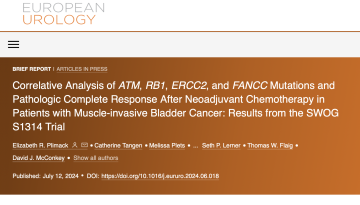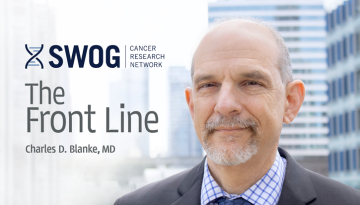SWOG's 2023 Impact Report
Happy 2024! We’ve posted SWOG’s Impact Report for the year just ended, and I have to say, 2023 was a more than pretty good year for our group. The annual Impact Report tracks a handful of key performance indicators and highlights some of our most significant results, initiatives, and news from the past year.
Among those key performance indicators, our 2023 counts of trial activations, papers published, and abstracts presented at professional meetings were at or near record levels for SWOG. Our patient accrual numbers were at their highest since 2017 and showed a significant increase over 2022 figures, primarily due to a huge bump in the number of enrollments to our NCORP studies.
In celebrating impressive 2023 numbers, however, we should also keep the long view in mind – averages and trends over time tend to be more valuable indicators than snapshots of specific windows.
Among the 2023 highlights in the Impact Report, front page news is our board of governors’ selection of Drs. Primo “Lucky” Lara, Jr., and Dawn Hershman as SWOG group co-chairs-elect. Below the fold, we have plenty of other great news to report as well:
- Practice-changing results in bladder cancer, leukemia, lymphoma, and melanoma (which in part contributed to a record year for SWOG at ASCO’s annual meeting)
- Important milestones such as the launching of Pragmatica-Lung and the successful completion of the DART basket trial in rare cancers
- Major initiatives bearing fruit, such as our advanced practice providers task force and our diversity, equity, and inclusion champions program
- A banner year for support from The Hope Foundation, including the approval of the Foundation’s largest-ever pledge – $1.4 million to our Statistics and Data Management Center to fund complex data projects
Along with presenting the good news, I want to also express profound gratitude to those who have made it happen, starting with the patients who are taking part in our clinical trials.
I’m also enormously grateful to our members and investigators who develop, conduct, and report results from our research, and to our SWOG staff, who provide both the structure and the glue that hold this endeavor together. Given our outstanding 2023 tally of trial activations (five in the first quarter alone!), I want to give a special shout out to our protocol department staff, who have outdone even themselves. Also to our publications manager Pat Arlauskas, who handled a record publications total for 2023. I’m in awe and truly grateful.
Please take a look at our Impact Report. It’s a compendium of what you accomplished in 2023. My ultimate takeaway from it is this – it promises a stellar 2024 for the SWOG Cancer Research Network.
___________________________________________________
Trial of the Week
S1900K: A Randomized Phase II Study of Tepotinib with or without Ramucirumab in Participants with MET Exon 14 Skipping Positive Stage IV or Recurrent Non-Small Cell Lung Cancer (Lung-MAP Sub-Study)
Our newest trial is Lung-MAP biomarker sub-study S1900K, targeted to patients with advanced non-small cell lung cancer that has a MET exon 14 skipping gene mutation. Patients will be randomized to tepotinib (a MET inhibitor) with or without ramucirumab (a VEGFR2 inhibitor).
The S1900K team hypothesizes that resistance to treatment with a MET inhibitor such as tepotinib results from VEGFR2 signaling. The sub-study asks if adding the VEGFR2 inhibitor ramucirumab can enhance tepotinib’s effectiveness and reduce the peripheral edema many patients experience with tepotinib.
The S1900K study chair is ECOG-ACRIN’s Paul K. Paik, MD, of Memorial Sloan Kettering Cancer Center. Xiuning Le, MD, of MD Anderson Cancer Center, is co-chair, and Mary Redman, PhD, is lead statistician on the study.
As with S1900G, documentation of the qualifying gene alteration for S1900K can come from a local CLIA-certified lab (it does not have to come from Foundation Medicine testing).
If you have the LUNGMAP screening protocol open at your site, please remember that the master protocol is designed as a complete package: the goal is to offer patients a full range of biomarker-driven sub-studies so that we can provide them with as many options as possible for targeted therapy for their NSCLC.
And if you have Lung-MAP open, don’t forget about the S2302 Pragmatica-Lung study. It’s the phase 3 follow-on to our previous non-match sub-study – S1800A – with a pared back set of eligibility criteria and data collection requirements, and with no image or specimen collection.
Learn more about the newest Lung-MAP sub-study on the SWOG S1900K page or the CTSU S1900K page, and please consider opening it at your site. A patient-friendly summary of S1900K is also available.
Other Recent Stories



